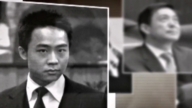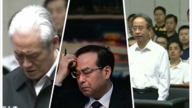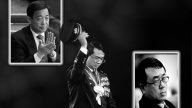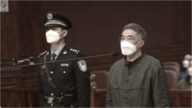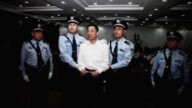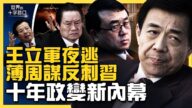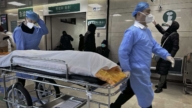【新唐人2012年4月21日讯】大陆有关部门正在调查薄熙来在重庆市担任市委书记期间,数十亿美元的政府支出。知情人士透露,这次调查,特别指向那些有利于薄熙来跻身中共高层,提升形象的基础设施建设,以及庞大的保障房开发项目。外界认为,由于薄熙来花费大量资金,导致重庆过度的支出和高债务,未来重庆百姓可能会背上沉重的经济负担。
美国《华尔街日报》发表文章说,薄熙来上个月被免职之后,重庆市发改委和财政局联合下发紧急通知,重庆市开始清查各级政府债务,清理全市政府投资项目。
重庆市财政部门的一位官员表示,“清理”政府投资项目,主要是针对重庆的一些大项目,和有助于薄熙来跻身中共中央高层领导队伍的项目。目前还不清楚薄熙来任职期间,重庆政府到底使用了多少银行贷款,来支持各种政府项目,只知道薄熙来在重庆最得意的植树项目,花费惊人。薄熙来在公开场合说,植树活动,每年花费人民币100 亿元。
据报导,重庆市政府总债务已高达 5000亿人民币,相当于2011年全国发债的一半,重庆市政府实际上已经破产。
而美国“美林银行”的报告显示,去年重庆7600亿元的固定资产投资中,绝大部分来自当地政府设立的八个融资平台,这些融资公司主要依靠土地作为抵押从银行借款,并以土地增值作为再融资的资金来源。
最近几个月,投资者和分析人士表达了对这类融资平台公司能否如期偿还债务的忧虑。如果这些机构违约,在北京执行楼市调控政策的背景下,土地贬值可能会给银行和其他投资者带来重大损失。
时事评论员蓝述指出,薄熙来整个投资的决策过程,都是黑箱作业。
蓝述:“不管他是通过哪个渠道,只要是政府的钱,就是纳税人的钱,把纳税人的钱拿到手上,由他来决定怎么样去花。”
“美林”(Bank of America Merrill Lynch)说,去年重庆市凭借16.4%的经济增速,使重庆成为中国各省份和直辖市中,经济增速最快的地区。
大陆经济投资顾问郑先生:“老百姓衡量经济数据不是看这个,他是看身边确确实实的变化,他的工资长了没有?物价长了没有?经济形势好了没有?0103 ——=0114只是为了追求GDP,纯粹为了数据,而搞的各种投资和什么数据,那个没有什么意义。对老百姓没有什么意义。”
重庆市民刘先生:“现在的统计局都是掺假的。我们(工资)一千多块钱一个月,一个月只能自己用,养家糊口都很成问题,我们表面上还是一个国营企业。”
据了解,薄熙来在重庆大力提倡的是由政府引导的“不透明”经济模式。依靠的是大量财政资金的注入,用于有助提升他形象的基础设施项目建设,以及庞大的“保障房”开发。之前,薄熙来承诺,到2012年将为240万人建设“廉租房”。
重庆市民刘先生:“听政府说是建了保障房,但这些保障房是建给谁了?我们不清楚。”
重庆市民钟先生:“他们是像彩票一样摇号,肯定有假。因为我有几个朋友好多次他都没有摇上号。”
蓝述认为,那是变相的公款私用。
时事评论员蓝述:“薄熙来用这个钱这样去做的目地,还是用纳税人的钱和民营企业家的钱把他蒐刮来以后,给他自己制造形象,为他的个人野心,或者他个人的政治前途做装备,这个实际上是一个变相的公款私用。”
而大陆经济投资顾问郑先生也认为,薄熙来在重庆搞的那些项目的资金,完全是来自权力垄断。
大陆经济投资顾问郑先生:“作为一个国家的公民,你为这个国家纳税,你属于纳税人,就有权力监督政府的各项投资决策,在它的各项投资政策和投资方案,是否合理?是否科学?是否经得起专家的验证?他找了几个专家在这个决定政策出台之前,有没有经过听证、认证和事后的审计?时间证明这一切都没有。”
蓝述认为,政府不会制造任何产值,这些债务最后还是得重庆的老百姓去承担。
采访编辑/唐睿 后制/周天
Bo’s Government Spending Check Up
Mainland authorities are investigating billions of dollars worth of government spending. It was directed to Chongqing, during the time that Bo Xilai was Chongqing party secretary. It is said the investigation particularly points to the construction of infrastructure which was good for Bo Xilai, in that it enhanced his image among CCP leadership figures.
This along with the huge projects of public housing development. It is believed that Bo Xilai had spent a lot of money, resulting in excessive spending and high debt in Chongqing. In the future, Chongqing people may have to carry a heavy economic burden.
Wall Street Journal published an article, saying that after Bo Xilai had been dismissed last month, the Chongqing Municipal Development and Reform Commission and the Bureau of Finance jointly issued an urgent notice. They began to check all levels of government debt, and to clear off all municipal government investment projects.
An officer in Chongqing municipal finance department said that, the “clearing off" of government investment projects mainly focuses on some large projects in Chongqing. It includes those helping Bo to ascend into senior leadership of the CCP Central Committee. It is now clear how much bank loans were used on projectsby Chongqing government during the term of Bo Xilai.
The tree planting project in Chongqing, of which Bo is the most proud, involved spending a huge amount of money. Bo Xilai said in public that the tree planting activities required RMB 10 billion to be spent annually.
It is reported that Chongqing municipal government debt has reached RMB 500 billion, being equivalent to half of 2011 national bonds. This means that Chongqing municipal government is actually bankrupt.
According to reports from Bank of America Merrill Lynch, there was investment of RMB 760 billion in fixed assets last year in Chongqing. This was mostly from eight local government financing platforms. It mainly rely on the land as collateral for bank loans, and the value-added land as a source of funding for refinancing.
Recently, investors and analysts expressed concerns about whether such financing platforms could pay back in time. If these companies defaulted, in the context of market regulations of Beijing, land devaluation is likely to cause significant losses to banks and other investors.
Commentator Lan Shu pointed out that the all investment decision-making process of Bo was hidden in a black box.
Lan Shu: “No matter through which channels it comes, as long as it is government’s money, it is taxpayers’ money. Bo decided himself how to spend taxpayers’ money."
Bank of America of Merrill Lynch said, that last year in Chongqing, economic growth was 16.4%. It was the fastest among all China’s provinces and municipalities.
The mainland economy investment adviser Mr. Zheng points out : “Ordinary people measure the economic data with actual changes around them, not these data and ranks. Have their salaries increased? Has the economy improved?
The pursuit of GDP and data, and of investments figures are meaningless to ordinary people."
A Chongqing citizen, Mr. Liu says: “The statistical office information is adulterated. Our (Wages) are about RMB 1,000 per month, which is only enough for ourselves, it is difficult to feed our families. We are a state-owned enterprise on the surface."
In Chongqing, Bo strongly advocated the government-led opaque economic model. It relies on the injection of huge financial funds.
It is used for infrastructure projects to improve his image, and for huge public housing" developments. He promised before that by 2012, he could finish the construction of low-rent housing for 2.4 million people.
Mr. Liu in Chongqing adds : “The government is said to be building public housing. However, we do not know whom these buildings are built for."
Chongqing citizen Mr. Zhong: “They are doing a lottery. It must be false. A few friends of mine did not get the results, they were led to expect in terms of housing development.”
Lan Shu believes that Bo’s methods are a disguised form of defalcation.
Lan Shu: “By doing things his way, Bo used taxpayer’s money, and private entrepreneurs to improve his own image. It was all solely for the goals of his personal ambition, or for his own political future. It is actually a disguised form of defalcation.”
The mainland economy investment adviser, Mr. Zheng believes Bo’s projects in Chongqing relied completely on power monopoly in funding.
Mr. Zheng: “As a citizen of a country, you pay taxes for that country. You are a taxpayer, and have right to supervise decisions in investments, to judge if they are reasonable, scientific, and could withstand the expert validation. Before his decision, Bo did find a few experts. But was there a hearing, a certification or a post-audit? It is proved that there were none of these, none.”
Lan Shu said the government doesn’t produce output values, so these debts eventually will be paid by Chongqing citizens.



